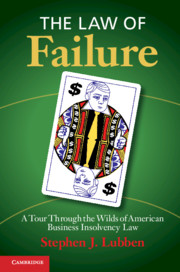
- Publisher:
- Cambridge University Press
- Online publication date:
- August 2018
- Print publication year:
- 2018
- Online ISBN:
- 9781108100069
- Subjects:
- Economics, Financial Law, Law, Finance and Accountancy


If a broker-dealer liquidates in federal bankruptcy court, why does an insurance company liquidate in state court, and a bank outside of court altogether? Why do some businesses re-organize under state law 'assignments', rather than the more well-known Chapter 11 of the Bankruptcy Code? Why do some laws use the language of bankruptcy but without advancing policy goals of the Bankruptcy Code? In this illuminating work, Stephen J. Lubben tackles these questions and many others related to the collective law of business insolvency in the United States. In the first book of its kind, Lubben notes the broad similarities between the many insolvency systems in the United States while describing the fundamental differences lurking therein. By considering the whole sweep of these laws - running the gamut from Chapter 11 to obscure receivership provisions of the National Bank Act - readers will acquire a fundamental understanding of the 'law of failure'.
'Professor Lubben has a great knack for making the most complicated matter understandable. The Law of Failure balances the depth of analysis that's often required with the clarity and practicality that practitioners demand.'
Robert E. Gerber - former US Bankruptcy Judge, Southern District of New York
'Required reading for practitioners and policy makers who need to plumb the intricacies of the divergent insolvency and restructuring systems in the United States … One can only hope that this thorough work spurs some thoughtful rethinking and re-engineering of the myriad inconsistent and often inefficient systems of the Law of Failure.'
Richard Levin - co-drafter of the United States Bankruptcy Code, Co-Head of Restructuring and Bankruptcy Practice, Jenner & Block LLP, New York
'[Lubben's] thorough march through the byzantine provisions of the various financial distress resolution regimes is a scholarly delight. His writing is as captivating as his analysis is thorough. More importantly, the questions he raises regarding the overlap (and inconsistencies) among the various regimes are critical for anyone interested in coherent regulatory policy.'
John A. E. Pottow - John Philip Dawson Collegiate Professor of Law, University of Michigan Law School
'Lubben provides a concise academic analysis of American business insolvency law for students and practitioners. He presents historical and topic-specific approaches to a body of law that goes beyond a basic understanding of federal bankruptcy law. His purpose in writing the book is to share his exploration of the vast array of state and federal insolvency laws, from Nevada’s insolvent campgrounds law to the Dodd–Frank Act. His reader-friendly content includes such helpful information as an explanation of a partnership law concept called the 'jingle rule'. It also includes historical trivia: at the time the 1898 Bankruptcy Act was passed, with the exception of the Civil War period, the primary activities of the federal government had been to operate the post office and collect tariffs. Much of the book covers examples of insolvencies not covered under the current Bankruptcy Code.'
E. G. Ferris Source: Choice
 Loading metrics...
Loading metrics...
* Views captured on Cambridge Core between #date#. This data will be updated every 24 hours.
Usage data cannot currently be displayed.